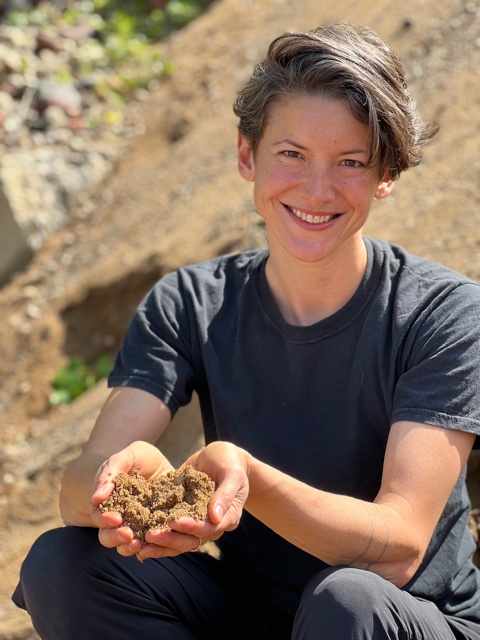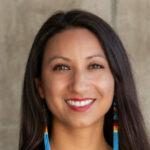
Editor’s Note: S. Perl Egendorf is a winner of The Story Exchange’s 2023 Women In Science Incentive Prize.
S. Perl Egendorf has spent the morning in frantic meetings, fighting funding cuts to New York City’s compost project. All community composting will be cut – a “disastrous” decision, Egendorf explains.
Many of the compost project sites provide direct services to low-income neighborhoods and people of color, supporting school and community gardens, and tree planting, and Egendorf has been instrumental in facilitating the initiatives.
Egendorf is an assistant professor of environmental studies and science at Pace University, and studies urban soils – particularly those in New York City, Egendorf’s hometown, and their intersections with food and climate justice.
Egendorf, who uses they/them pronouns, loves soil. “It’s the interface between the living and the non-living world,” they explain. “It’s really necessary to support justice, especially in cities where so many of us grow up feeling like nature exists somewhere else.” Soil’s functions in city ecosystems are impressive, from filtering water to reducing stormwater impacts to supporting green spaces.
But there’s a darker side to soil; it can hold and store dangerous contaminants, such as arsenic or lead. It’s an environmental justice issue as minorities are disproportionately exposed to those materials. That’s why Egendorf helped develop New York City’s Clean Soil Bank, which transfers clean native soil from deep construction sites to community projects like gardens.
And it’s the driving force behind Egendorf’s next project: a mobile soil lab.
Egendorf is raising funds to build a solar-powered truck that can sample and process urban soils then transport them to a lab, while also sharing STEM skills with residents – youths and elders alike. The aim is to bring science into New York’s most vulnerable communities, which often lack access to nature and unfairly suffer the impacts of climate change. For example, neighborhoods with a higher number of Black residents are hotter than other areas due to the urban heat island effect – which can be mitigated by having more open space and green areas.
Egendorf currently works with numerous communities around the city to develop personalized projects for their neighborhoods. Egendorf studies the health of the soil, which compost works best for that neighborhood, and teaches individuals how to grow food from compost. “Each project I do varies based on who’s involved and what their interests are,” Egendorf explains. “And we share knowledge with each other.”
Egendorf also teaches lab skills – how to take soil samples and test them for contaminants – and has seen the impact that hands-on work makes for young people of color. Black and Hispanic people are vastly underrepresented in STEM professions, due to poor education opportunities, few role models and a lack of encouragement to pursue these subjects. But Egendorf has witnessed seeing youths connecting with the soil – as well as the science. “My goal is to show people how meaningful and exciting science is and support them in choosing this path if they choose it,” they say.
In the future, a mobile lab could help Egendorf more easily reach communities spread across the city’s boroughs. The distance between the neighborhoods was an impetus for it. “For one soil project we were in Queens, and the labs I worked in were in Brooklyn,” they remember. “It was almost impossible for anyone to come.”
Meanwhile, Egendorf says the payoff in the projects is watching youths connect with the soil that Egendorf so loves. “You see these smiles on kids’ faces, because they’re munching away on a giant leaf that they grew, they dug their hands in the dirt and connected with the compost. It’s so exciting to watch.” ◼️



